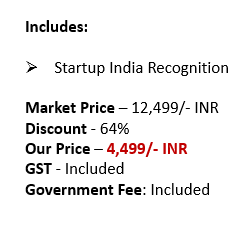Tax Deducted at Source (TDS) is an essential mechanism for the collection of tax in India. It requires the deductor to deduct
- Home
- Income Tax
- GST
- Registration
- Sole Proprietorship Registration
- Section 8 Company
- Partnership Firm Registration
- Nidhi Company Registration
- Private Limited Company Registration
- Trust Registration
- One Person Company Registration (OPC)
- Hindu Undivided Family (HUF)
- Limited Liability Partnership (LLP)
- PF Registration
- Professional Tax
- Digital Signature
- FSSAI Registration
- TAN Application
- Import Export Code (IEC)
- PAN Application
- MSME Registration
- Start Up India Registration
- Professional Tax
- Accounting
- Blog
start up india Registration
Startup India is a flagship initiative of the Government of India aimed at promoting the growth of startups in the country. The initiative offers various benefits and incentives to startups, including access to funding, tax exemptions, and other support services. Here is an overview of the Startup India registration process:
- Basic
Enquire Us
Start Up India Registration
Startup India is a flagship initiative of the Government of India aimed at promoting the growth of startups in the country. The initiative offers various benefits and incentives to startups, including access to funding, tax exemptions, and other support services. Here is an overview of the Startup India registration process:
- Eligibility: To be eligible for Startup India registration, a company must be registered as a private limited company or a registered partnership firm or a limited liability partnership (LLP).
- Register on Startup India Portal: The next step is to register on the Startup India portal, which is a single-window platform for all startup-related activities. The registration process requires filling out an online form with basic information about the company, its founders, and the nature of the business.
- Self-Certification: After registration, the startup must self-certify that it meets the eligibility criteria, including that it is working towards innovation, development, or improvement of products, processes or services, or if it is a scalable business model with high potential for employment generation or wealth creation.
- Recognition: Once the self-certification is completed, the startup will be recognized by the government as a “Startup”. The startup will be issued a certificate of recognition, which can be used to avail the benefits and incentives offered by the government.
- Benefits and Incentives: Some of the benefits and incentives offered by the government to recognized startups include tax exemptions, faster patent registration, access to funding, and other support services.
Startup India registration is a simple and straightforward process that provides various benefits and incentives to eligible startups. By registering with Startup India, startups can access various support services and opportunities to help them grow and scale their businesses.
Understanding The Concept Of Dpiit
DPIIT stands for Department for Promotion of Industry and Internal Trade, which is a department under the Ministry of Commerce and Industry in India. The department is responsible for formulating and implementing policies related to promotion of industries and trade in India.
The DPIIT has been playing a crucial role in promoting entrepreneurship and startups in India. It has launched various schemes and initiatives to encourage the growth of startups in the country, including the Startup India initiative. The department also acts as a facilitator for startups by providing them with access to funding, mentorship, and other support services.
The DPIIT also plays an important role in promoting the ease of doing business in India. It works towards simplifying the regulatory environment for businesses and promoting investments in the country. The department also undertakes measures to improve the competitiveness of Indian industries and promote the growth of exports.
Procedure To Get Dpiit Certificate
To get a DPIIT (Department for Promotion of Industry and Internal Trade) certificate, a startup must follow the below procedure:
- Check Eligibility: The first step is to check if your startup is eligible for registration under Startup India. To be eligible, a startup must be registered as a Private Limited Company, Limited Liability Partnership (LLP) or a Partnership Firm.
- Register on Startup India Portal: Once you have checked the eligibility, the next step is to register on the Startup India portal by filling out an online form with basic information about the company, its founders, and the nature of the business.
- Self-Certify: After registering on the Startup India portal, the startup must self-certify that it meets the eligibility criteria, including that it is working towards innovation, development, or improvement of products, processes, or services, or if it is a scalable business model with high potential for employment generation or wealth creation.
- Upload Documents: After self-certification, the startup needs to upload the required documents such as Incorporation Certificate, PAN Card, and address proof, etc.
- Submit Application: Once all the required information and documents have been submitted, the application must be submitted to the DPIIT for review.
- Approval: After reviewing the application, the DPIIT will approve the registration and issue the Startup India Certificate.
It is important to note that the DPIIT certificate is not mandatory for a startup to operate in India. However, it provides several benefits and incentives that can help the startup to grow and scale. By following the above procedure, a startup can get a DPIIT certificate and access various support services and opportunities to help them succeed.
What Are The Benefits Of Registration Under Startup India?
There are several benefits of registration under Startup India. Some of the key benefits are:
- Tax Exemptions: Startups registered under Startup India are eligible for various tax exemptions. For example, they are exempted from paying income tax for the first three years of operations, subject to certain conditions.
- Faster Patent Registration: Startups registered under Startup India can get their patents registered faster through a fast-track mechanism. This helps startups to protect their intellectual property and helps them to compete better in the market.
- Access to Funding: Startups registered under Startup India are eligible for various funding schemes launched by the government, such as the Fund of Funds for Startups (FFS). The FFS provides financial support to startups by investing in SEBI-registered Alternative Investment Funds (AIFs).
- Self-Certification: Startups registered under Startup India can self-certify their compliance with various labour and environmental laws. This reduces the regulatory burden on startups and helps them to focus on their core business activities.
- Networking and Collaboration Opportunities: Startups registered under Startup India can access various networking and collaboration opportunities through events and initiatives organized by the government. This helps startups to connect with other startups, investors, mentors, and industry experts.
Registration under Startup India provides startups with various benefits and incentives that can help them to grow and scale their businesses. By taking advantage of these benefits, startups can overcome some of the common challenges that they face and become successful in their respective industries.
Documents Required At The Time Of Startup India Registration Process
To register under the Startup India initiative, the following documents are required:
- Certificate of Incorporation or Registration: This document is required to prove that the startup is registered as a Private Limited Company, Limited Liability Partnership (LLP) or a Partnership Firm.
- PAN Card: PAN Card of the company or the partners/directors is required for verification purposes.
- Address Proof: Address proof of the registered office of the company is required, such as electricity bill, telephone bill, etc.
- Letter of Recommendation: A letter of recommendation from any of the following is required to prove that the startup is working towards innovation, development or improvement of products, processes or services or if it is a scalable business model with high potential for employment generation or wealth creation:
- Incubator established in a post-graduate college in India.
- Incubator recognized by the Government of India.
- Letter of support from an incubator, which is funded (in relation to the project) from the Government of India as part of any specified scheme to promote innovation.
- Letter of recommendation or funding by the Government of India or any state government or any Central or State Government agency.
5. Ownership Details: Details of ownership and shareholding pattern of the startup.
6. Bank Account Details: Bank account details of the startup.
These are the basic documents required for Startup India registration. However, additional documents may be required depending on the nature of the business and other factors. It is advisable to check the Startup India website for the latest information on the required documents.
Eligibility for Startup India Registration
To be eligible for Startup India registration, a company must meet the following criteria:
- Company Structure: The company should be registered as a Private Limited Company, Limited Liability Partnership (LLP), or a Partnership Firm.
- Age of the Company: The company should be less than 10 years old from the date of incorporation.
- Turnover: The company’s annual turnover should not exceed INR 100 crores in any of the previous financial years.
- Innovation: The company should be working towards innovation, development, or improvement of products, processes, or services, or if it is a scalable business model with high potential for employment generation or wealth creation.
- Certification: The company must obtain a certification of innovation from the Department of Industrial Policy and Promotion (DPIIT).
Startups that meet the above eligibility criteria can register under the Startup India initiative to avail various benefits and incentives offered by the government. It is important to note that while registration is not mandatory for a startup to operate, it provides several advantages and support services that can help the startup to grow and scale its business.
FAQ’s
Q1. Is Startup Registration mandatory?
- No, Startup Registration is not mandatory. However, registration under Startup India can provide various benefits and incentives to startups, such as tax exemptions, access to funding, faster patent registration, and other support services.
Q2. Can an individual register as a startup?
- No, only companies registered as a Private Limited Company, Limited Liability Partnership (LLP), or a Partnership Firm can register under Startup India.
Q3. What is the eligibility criteria for Startup Registration?
- To be eligible for Startup Registration, a startup must be registered as a Private Limited Company, Limited Liability Partnership (LLP), or a Partnership Firm, and must be working towards innovation, development, or improvement of products, processes, or services, or if it is a scalable business model with high potential for employment generation or wealth creation.
Q4. Is there any fee for Startup Registration?
- No, there is no fee for Startup Registration.
Q5. How long does it take to get the Startup India Certificate?
- The time taken to get the Startup India Certificate can vary depending on the completeness of the application and the workload of the DPIIT. However, it usually takes 7-10 days to get the certificate.
Q6. Can a startup apply for registration under Startup India after the commencement of business?
- Yes, a startup can apply for registration under Startup India after the commencement of business, provided it meets the eligibility criteria.
Q7. What are the benefits of Startup Registration?
- Some of the key benefits of Startup Registration include tax exemptions, access to funding, faster patent registration, self-certification of compliance with labor and environmental laws, and networking and collaboration opportunities.
Related Guides
The introduction of Section 206AB in the Income Tax Act, of 1961, has added a new layer of complexity to tax compliance
The growth of e-commerce has revolutionized the way businesses operate and consumers shop. However, with this growth comes the need for stringent
The rapid rise of cryptocurrency has prompted regulatory bodies worldwide to establish clearer tax regulations. In India, the fiscal year 2024-25 brings
ITR Services
Other Services
Documents Required
- Certificate of Incorporation or Registration
- PAN Card
- Address Proof
- Letter of Recommendation
- Ownership Details
- Bank Account Details


